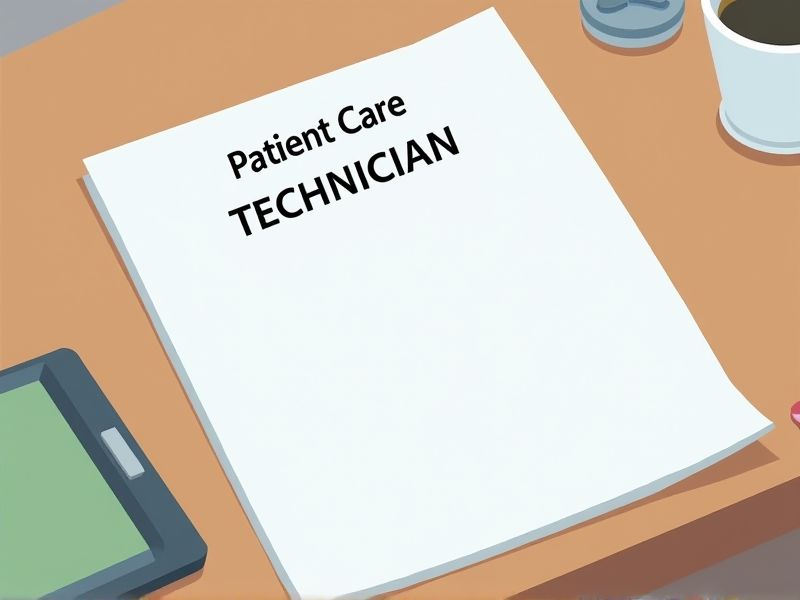
Patient Care Technicians play a crucial role in healthcare, directly impacting patient outcomes by providing essential support to nursing staff. Acquiring certain certifications ensures they have the requisite knowledge and skills to perform tasks safely and effectively. These credentials also offer a competitive edge in the job market, reflecting a commitment to high professional standards. Here are key certifications that can benefit Patient Care Technicians.
Certified Nursing Assistant (CNA)
Certified Nursing Assistants (CNAs) provide essential support in patient care, allowing Patient Care Technicians to manage more complex tasks. CNAs assist with basic patient needs such as bathing, feeding, and mobility, ensuring patient comfort and dignity. Their close interaction with patients helps in early identification of potential health changes, assisting in timely medical intervention. CNAs enable a team-based approach to healthcare delivery, improving overall efficiency and patient outcomes.
Patient Care Technician (PCT) Certification
Holding a Patient Care Technician (PCT) Certification establishes a standardized skill level, indicating that the technician is adequately trained to provide quality care. Certification often results in improved patient outcomes, as certified PCTs are versed in essential procedures and protocols. Employers typically prefer hiring certified PCTs because it reduces training costs and ensures compliance with healthcare regulations. Certified PCTs often experience career advancement opportunities, benefiting from increased job security and potential for higher salaries.
Basic Life Support (BLS)
Basic Life Support (BLS) equips Patient Care Technicians with essential skills to handle cardiac or respiratory emergencies effectively. Studies show timely BLS interventions can significantly increase survival rates in critical situations. Patient Care Technicians often encounter situations requiring immediate response, making BLS training crucial for patient safety. Facilities prioritize BLS-trained staff to ensure high-quality care and compliance with healthcare standards.
Advanced Cardiac Life Support (ACLS)
Advanced Cardiac Life Support (ACLS) is needed for Patient Care Technicians as it equips them with the skills to recognize and respond to cardiac emergencies, directly affecting patient survival rates. Training in ACLS improves decision-making and coordination during critical situations, enhancing patient outcomes. ACLS certification allows Patient Care Technicians to work more effectively in emergency and intensive care settings, ensuring swift and appropriate interventions. Knowledge of ACLS protocols ensures consistency in patient care, aligning with best practices in healthcare settings.
Electrocardiogram (EKG) Technician Certification
Certification in Electrocardiogram (EKG) techniques is vital for a Patient Care Technician because it equips them with the skills to accurately monitor and interpret heart activity. Accurate EKG readings can lead to early detection of heart issues, directly impacting patient outcomes. Formal certification ensures standardized knowledge, reducing the risk of errors in a clinical setting. Certified technicians often earn greater trust from both healthcare teams and patients, enhancing workflow efficiency and patient confidence.
Phlebotomy Technician Certification
The Phlebotomy Technician Certification ensures that a Patient Care Technician possesses the necessary skills to safely and effectively draw blood, a common demand in patient care settings. It enhances the technician's understanding of proper handling and labeling of blood samples, reducing the risk of errors in diagnostic tests. Certification provides a standard of competency that assures employers and patients of the technician's proficiency in blood collection techniques. Having this certification can improve job prospects and potentially lead to increased job security and advancement opportunities within healthcare facilities.
Cardiopulmonary Resuscitation (CPR)
CPR is crucial for patient care technicians as it significantly increases the survival chances of cardiac arrest victims. Mastery of CPR enables these professionals to immediately intervene during emergencies, reducing time before advanced medical care arrives. As healthcare environments are fast-paced and unpredictable, having CPR skills ensures technicians can respond effectively to sudden health deteriorations. Regular CPR training also helps maintain a high standard of competency and readiness among patient care technicians in hospitals and clinics.
Intravenous (IV) Therapy Certification
Obtaining Intravenous (IV) Therapy Certification enhances a Patient Care Technician's ability to perform critical tasks effectively, as it enables them to safely administer medications and fluids directly into a patient's bloodstream. Employers often seek certified technicians to ensure compliance with healthcare regulations and to promote patient safety. With the certification, technicians gain confidence and competence in managing IV lines, which contributes to better patient care outcomes. Certified technicians are generally more valuable to medical teams, improving overall healthcare facility efficiency and patient satisfaction.
Infection Control Certification
Infection Control Certification equips Patient Care Technicians with the necessary skills to prevent and manage infections, reducing the risk of healthcare-associated infections. Proper infection control practices minimize patient and staff exposure to infectious agents, enhancing overall patient safety. Certification ensures standardized training, which leads to consistency in procedures across healthcare facilities. By staying informed about the latest infection prevention protocols, certified technicians contribute to improved patient outcomes and a safer healthcare environment.
HIPAA Compliance Certification
HIPAA compliance certification ensures that Patient Care Technicians understand the importance of protecting sensitive patient health information, which is essential in maintaining patient trust and confidentiality. When technicians are trained in HIPAA regulations, they are better equipped to handle patient data securely, reducing the risk of data breaches. Certification also fosters a workplace culture that prioritizes privacy and data security, aligning with legal requirements and institutional standards. This adherence minimizes potential legal liabilities for healthcare facilities, ensuring a safer and more secure environment for patient care.
Summary
When you earn certifications as a Patient Care Technician, your employment opportunities expand significantly. Certified technicians often experience better job security and potential for advancement in their careers. The additional skills and knowledge gained through certification can lead to improved patient care and satisfaction. Employers tend to favor candidates with certifications, which can result in higher earning potential.
